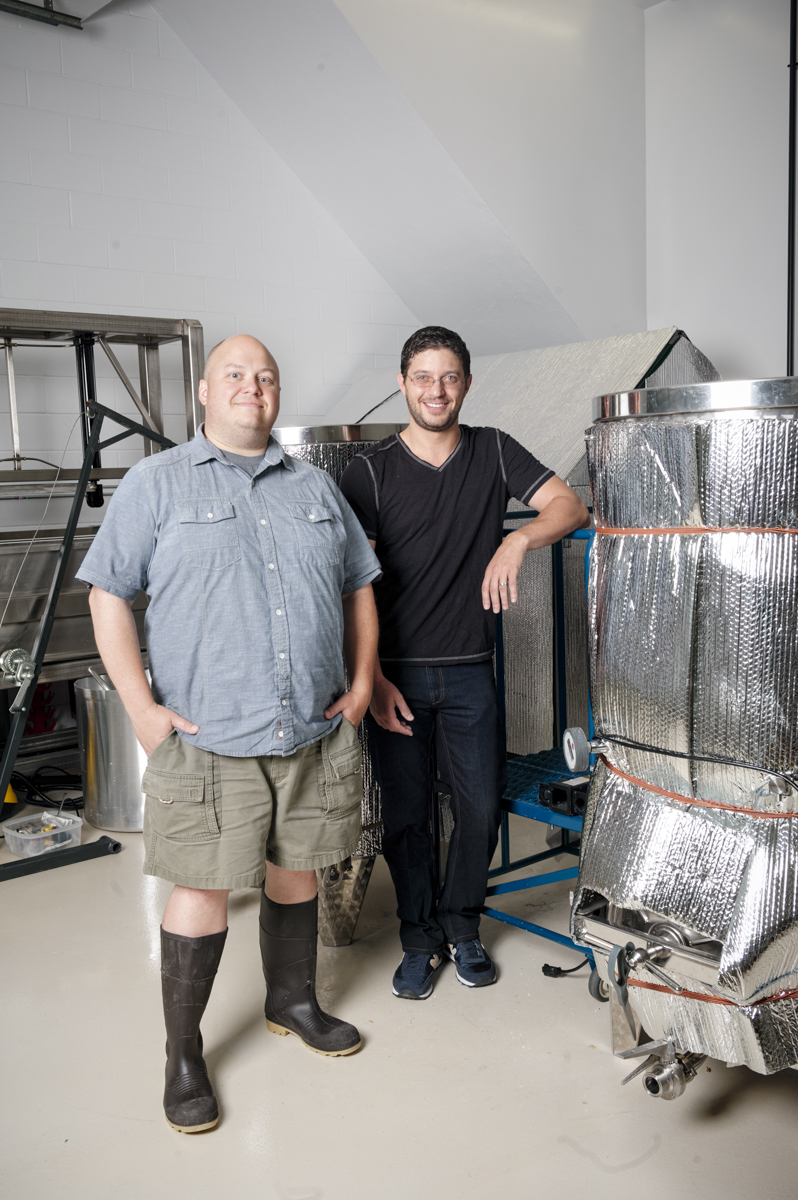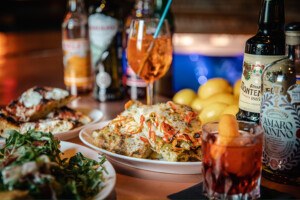Dovetail To Become Massachusetts’ First Sake Brewery

Todd Bellomy and Daniel Krupp of Dovetail Sake. Photo by Chelsea Kyle
Todd Bellomy’s life sounds like the stuff of fiction. A former Japanese language and linguistics major at UMass Amherst, Bellomy has spent the intervening years as a chef, sake brewer, and even a Japanese sword-making apprentice in the Saitama Prefecture.
“After college I ended up securing a position as a sword-making apprentice in this very remote small town of about 200 people,” Bellomy says. “I basically lived in a tool shed for a year and just worked under this very nice man who was an amazing sword-maker. That was really instrumental for me, just to learn about hard work, focus, and a lot of lessons that you can’t really pick up anywhere else. Unfortunately, that sort of thing is not really sustainable.”
Now Bellomy and his business partner, Daniel Krupp, are starting Massachusetts’ first sake brewery. Based in a 1,000-square-foot warehouse space in Waltham, Dovetail Sake will initially produce two styles, a nigori (which roughly translates to “cloudy”) and a junmai-shu, where the rice grains are polished to at least 70-percent.
“After talking to hundreds of people, our initial thought is to put out a nigori, which is a very approachable sake. We’re also looking to do a junmai that is really clean, fruity, flowery, and really drinkable. But we’re not going to use those words right out of the gate because you‘re going to overwhelm people. The big benefit is we can brew fresh sake and then deliver it to the drinker within a mile or two miles. Do we really thing that we’re going to brew better sake than a thousand year old brewery in Japan? No, at least not right away. But we don’t have to ship it 8,000 miles. That’s a big benefit, and it’s one of the major reasons the craft beer industry has been as popular as it is.”
When the Dovetail products hit shelves this winter, it will represent years of planning, training, and education. Krupp is a Level One graduate of sake guru, John Gaunter’s sake professional course, which takes students throughout Japan in order to learn from the country’s most revered brewers. And Bellomy—in addition to homebrewing—trained under the masters at Kikusui Brewing in Niigata and Asahi Shuzo in Yamaguchi, while juggling his former career at Boston Beer Company.
While waiting on state licensing to come through, Bellomy and Krupp have continued to tinker and experiment with their initial recipes. The two are currently playing with five sake rice varieties (all grown in California), four authentic Japanese yeast strains, and four different varieties of koji, the mold spore that converts rice starch into sugar. Despite the hodgepodge of variables, Bellomy is confident they’ll have a marketable product to sell by the end of the year.
“Education, really, is going to be the big thing for us,” Bellomy says. “I’ll be able to go into a store, sell the sake myself, and do tastings, dinners, and all that stuff. Over the last couple of years, I think I’ve done more sake events than the distributors and I’m just a guy with a blog. Once I get a product going out the door, my partner and I can focus on meeting people face-to-face. We’re pretty optimistic that we can get people interested in sake. The thought that sake is only enjoyed in Japanese restaurants with sushi is obviously false. There’s a lot of potential growth and I think people will start to realize you can pull burgers off the grill and sit in your backyard and drink sake. Or eat pizza with sake. It’s that accessible.”
Although Dovetail won’t immediately have a tasting room, the duo is planning on moving into a larger space in 2015 to accommodate tours and tastings.


